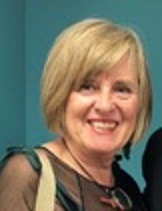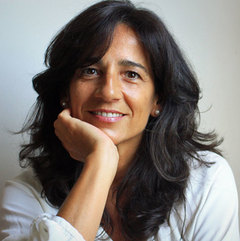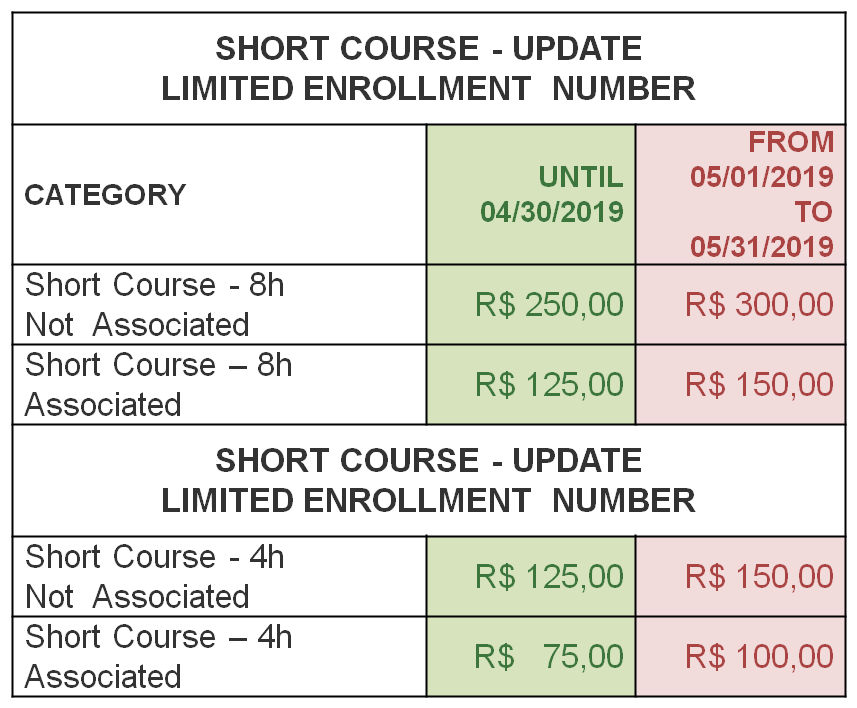Short Courses
SHORT COURSES
The short courses will take place on Jun 03, 2019, at EDX Space, Rio Branco Avenue, 124 - Downtown - Rio de Janeiro.
The Short Courses will be developed in Portuguese format.
The Short Courses have separate values according to the time duration.
There is no differentiated price for students, only for ABRAPAV, EAAP and AEPA Associates.
For short courses that admit the participation of Psychology students, check the type of requirement required.
SHORT COURSES FEES
1) Send an email to [email protected] with the following information:
Full name
Category (EAAP and AEPA Associates should be considered Associate Professional or Associate Student, as
appropriate).
Email
Address
City / State
Zip code
Telephone
Profession:
Institutional Afiliation:
Short Course and corresponding fee:
OBS:
1)The payment must be made in Reais (Brazilian currency) on the day of accreditation.
2) Students must present proof of their status at the time of the congress accreditation.
3) Wait for the pre-registration confirmation email.
CANCELLATION
In case of non attendance, the participant should send an email to [email protected].
COURSE A002 - Dare to fly: A program to overcame the fear of traveling by plane.
PhD María Luz Novis - Spain.

a. Time Duration: 08 hours
b. From 09:00 a.m to 06:00 p.m
c. Audience: Psychologists and Psychology students from the 7th period.
d. Objectives: To offer tools for the management of psychological intervention on the fear of flying
with the use of technologies and the integration of models; and Facilitate understanding of the
fear that prevents flying in an airplane, its special characteristics and individual and group
intervention strategies.
e. Description: Present points and tools to consider in the intervention on the fear of flying.
|
INTERNATIONAL CONGRESS OF AVIATION PSYCHOLOGY Rio de Janeiro, 3-5 June 2019 DARE TO FLY! A PROGRAM TO OVERCOME THE FEAR OF TRAVELING BY PLANE |
|
María Luz Novis |
|
1. Introduction • What is fear? • Are all fears the same? • Individual characteristics of the fear of flying: I will kill myself, I will die. • The theoretical model supporting the intervention process. • How to make a program tailored to the needs of the patient. • Process and results with virtual reality. 2) The Intervention • Differential diagnosis and return • Interview and polls • Frame • The power of interpersonal communication • The concept of hypnosis without trance (Ardone, G.) • Psycho-education • Delivery of the first tools • The elaboration and purpose of the hierarchy of fears • Training in relaxation: choose the appropriate exercises for each patient • Relaxation practice; preparation of audios • Homework: how to build it according to the needs and resources of the patient • Simulation in the clinic 3) Virtual Reality • The adaptive and creative process in the use of virtual reality • Preparation of RV protocol • Taking Virtual Realities • The therapeutic paradox: The "worst possible fantasy" • Biofeedback: RSG (psychogalvanic response) 4) Use of flight simulators • The therapeutic use in the cabin simulator and technical cabin. • Preparing for the cockpit simulator session • Exercises inside the simulator 5) Preparation and realization of the actual flight 6) Closing and follow-up sessions |
COURSE A004 - Mental health and psychological well-being among pilots: the implementation of Peer Support Programs in post-Germanwings
Psic. Cristina Albuquerque - Portugal
 a. Time Duration: 04 hours
a. Time Duration: 04 hours
b. From 02:00 p.m to 06:00 p.m
c. Audience: All interested.
d. Objective: To present the Peer Support Programs and their benefits.
e. Description: Interactive workshop, with the possibility of people being able to participate,
asking questions and exchanging ideas about the theme.
I INTERNATIONAL CONGRESS ON AVIATION PSYCHOLOGY
|
Cristina Albuquerque & Catarina Cunha |
1. Mental health and psychological wellbeing
2. Mental Health and aviation
3. EASA new regulation
4. Implementation of Peer Support Programs (PSP)
|


